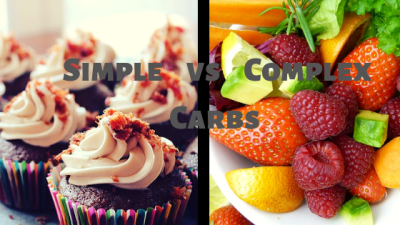Carbohydrates commonly known as “carbs” are one of the three main macronutrients, which also includes protein and fat. It’s important that we have a balanced diet that supplies us with the appropriate amounts of each to ensure our body has sufficient nutrients to function properly.
With that being said, carbs sometimes get a bad wrap due to the popularity of low carb diets. In reality, it’s not that all carbs are bad, it has more to do with the type of carbs one is consuming. You see, all carbs aren’t created equally, so it is beneficial to know the difference between simple and complex carbs and how each can affect the way that your body functions.
So first, let’s talk about carbohydrates in general.
On the molecular level, carbohydrates are composed of carbon, hydrogen and oxygen. This is why you will sometimes see them abbreviated as CHO. Carbs are sugars, starches and fiber in grains, vegetables and milk products.
As I have stated before, the food we eat provides our body with the fuel needed to function normally. Carbohydrates have several functions in the body which include:
- The body’s primary choice for energy. Meaning, the body prefers to use carbs for energy before protein and fat.
- Fuel for the Central Nervous System (CNS). Carbs help with brain function, mood and memory.
- Provide fuel for working muscles. When you are being physically active, the body needs carbs for energy.
Symptoms of CHO Deficiency
When you do not consume sufficient carbs it can lead to:
- Nausea
- Dizziness
- Constipation due to lack of fiber from fruits, veggies and whole wheat
- Lethargy (sluggish)
- Dehydration
- Bad breath
Another issue with not eating enough carbs is muscle depletion. When carb consumption is insufficient the body will use protein for fuel. Since it is being used for fuel it is no longer available to repair and build muscle which leads to depletion. This can also put a strain on the kidneys as they have to excrete the waste products of using so much protein.
So as you can see carbs are very beneficial and are needed. The problem comes in when we eat too many of the wrong type of carbs.
To explain, when we eat more carbs than we use immediately for energy, the excess is stored as glycogen (stored glucose) in the muscles and liver. Once glycogen stores are full the excess is then stored as fat. So if we are eating tons of bad carbs and not being active then of course it will lead to weight gain.
But if you think about it, eating excess of anything can lead to weight gain. So even if you are on a low carb diet and you are eating excess protein and fat, you will still gain weight so why focus on just cutting carbs?
So what are “good” and “bad” carbs? This is where the terms simple vs complex carbs come into play.
Simple vs. Complex Carbohydrates
Carbohydrates are labeled simple or complex depending on their chemical structure and how quickly they are absorbed and increase the blood sugar.
Simple Carbs

These are considered “empty calories” that are highly processed and provide no nutritional value in terms of vitamins, minerals and fiber. Simple carbs include:
- Candy
- Soda (diet and regular)
- White pasta and White bread
- Flour
- Cookies and Pastries
- White potatoes
Since simple carbs contain fewer additional nutrients, they are absorbed quickly into the bloodstream, leading to a quick rise in blood sugar. This quick rise will lead to temporary energy but is not long lasting which will lead to the dreaded “sugar crash”.
Complex Carbs

Include additional nutrients such as vitamins, minerals, fiber and smaller amounts of protein and fats. Complex carbs include:
- Fruits
- Vegetables
- Beans
- Whole Wheat bread and pasta
- Oatmeal
- Brown Rice
- Quinoa (seeds)
- Legumes (peas)
Since complex carbs contain additional nutrients they slow down absorption and help to stabilize your blood sugar.
Essentially “good” carbs are:
- High in fiber
- Low in saturated fat
- Low in refined sugars (corn syrup, white sugar, honey)
- High in additional nutrients (vitamins, minerals)
- Low in sodium
- Low in cholesterol and trans fat
Weight Loss
When you restrict carbs, yes weight loss will occur but it is mostly water weight. When carb intake is low the body will release stored glycogen but water is needed to make this happen, thus leading to water weight loss but not fat loss which should be your ultimate goal. You can only lose so much water weight, so eventually the weight loss will plateau.
As I have stated before in previous blogs, the only true way to lose weight is to be in a caloric deficit or in other words, burn more calories than you eat. Strictly cutting one important nutrient will not help with weight loss if you are still eating more calories than you burn.
It is best to have a well balanced diet that includes complex carbs, lean sources of protein and healthy fats. Oh and of course plenty of good H2O!
So now that you know that all carbs are not created equal, you can use this information to help improve your eating habits!
Take a look at your current eating habits, do you consume more simple or complex carbs? If simple is your answer, start to slowly transition into increasing your complex intake while decreasing your simple intake. Couple this will being more physically active and you have the recipe for healthy, maintainable weight loss!
Find Health in Every Day!
Dr. Lindsay


